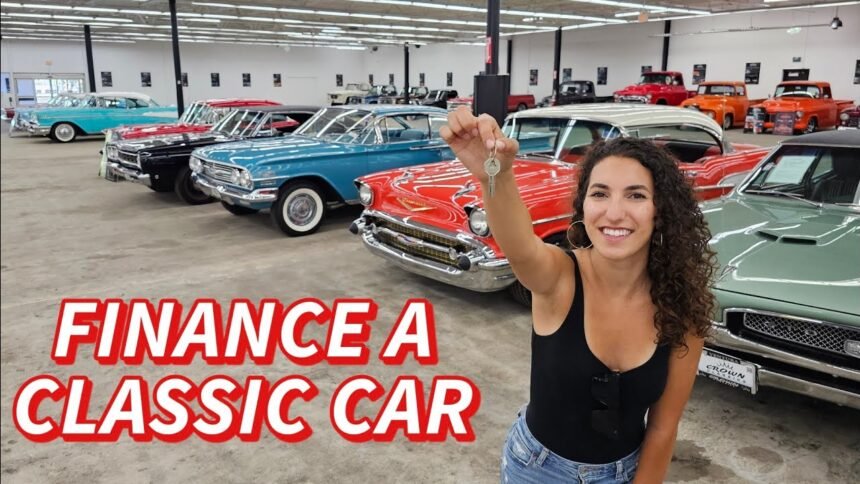For many Americans, owning a vintage Mustang, a ‘69 Camaro, or a timeless Porsche 911 isn’t just a dream—it’s a legacy on wheels. But as classic car prices continue to climb, more enthusiasts are turning to classic car financing to make their dream rides a reality. Whether you’re eyeing a fully restored showpiece or a project car to tinker with on weekends, securing the right financing can make all the difference between garage envy and keys in hand.
Classic cars aren’t just fun toys—they’re often appreciating assets, investments in culture, history, and style. On Reddit’s r/classiccars community, one user commented:
“I took out a loan to buy a ’67 Fastback, and I don’t regret it for a second. It’s worth more now, and the joy is priceless.”
That sentiment is echoed by thousands of collectors across the country who have found strategic financial paths to drive away with iconic vehicles.
In this blog, we’ll explore what classic car financing entails, how it differs from traditional auto loans, expert insights, financing options, and what you need to know to avoid costly mistakes.
What Is Classic Car Financing?
At its core, classic car financing is a loan or lease specifically tailored for the purchase of collectible, vintage, or antique vehicles—usually 10 years or older. While it might sound similar to a standard auto loan, the financing structure, lenders involved, and even approval criteria can differ significantly.
Classic cars often appreciate in value, making them attractive to collectors and investors alike. However, because they’re not everyday commuter vehicles, traditional banks may hesitate to offer standard financing terms. This is where specialty lenders and tailored financial products step in.
According to Hagerty, a leading name in collector car insurance and financing:
“A classic car is more than transportation—it’s passion, investment, and legacy. Financing it requires a unique approach that balances enthusiasm with smart financial planning.”
On Reddit, many users warn against using traditional car loans. One post on r/personalfinance read:
“Banks treated my ’71 Challenger like a liability. I had better luck with a classic car lender who understood the market.”
Why Classic Car Financing Is Different From Regular Auto Loans
With classic cars, value is not determined by make, model, or miles alone. Factors like historical significance, rarity, restoration quality, and market demand all play a role. This means lenders often require professional appraisals or valuation reports before approval.
While Kelley Blue Book might be enough for a 2015 Honda Civic, it won’t cut it for a 1965 Corvette Sting Ray. Lenders need reassurance that the car’s value justifies the loan amount.
Down Payments and Interest Rates
Classic car financing usually involves larger down payments—often 10–20% or more. Interest rates might also be slightly higher than conventional car loans due to perceived risk. However, some lenders offer competitive fixed rates, especially if the borrower has strong credit and the car holds high market value.
Reddit users on r/classiccars often recommend securing pre-approval through specialty lenders like Woodside Credit or LightStream, noting:
“They are way more flexible and knowledgeable than big banks.”
Loan Terms and Conditions
Terms can range from 24 to 120 months, with longer terms favored by high-end collectors to reduce monthly payments. Some loans may include clauses requiring you to insure the car with an agreed value policy or even limit mileage and usage.
Who Offers Classic Car Financing?
While many traditional financial institutions stay away from financing classics, a growing number of niche lenders specialize in these unique purchases.
Specialty Lenders
Companies like Woodside Credit, J.J. Best Banc & Co., and Collector Car Lending are known for their customized loan packages. These lenders understand the collector market, require fewer restrictions, and often work closely with auction houses and restoration shops.
Many Redditors vouch for Woodside Credit. One buyer shared:
“I used Woodside for my ‘68 GTO and had zero issues. Smooth process, flexible terms, and they respected my knowledge of the car’s value.”
Online Lenders
Fintech firms such as LightStream (a division of SunTrust Bank) offer unsecured loans that don’t require collateral. While not classic-specific, LightStream is praised for quick processing and flexible terms, making it ideal for buyers who already have appraisal data or auction documents.
Credit Unions and Local Banks
Some credit unions may offer niche auto loans with more flexible underwriting. If you have a strong relationship with your local bank or credit union, it’s worth inquiring—especially if they’re familiar with car shows or local collector markets.
Preparing for the Classic Car Loan Process
Securing classic car financing isn’t just about filling out a form. You’ll need to come prepared to show lenders that you’re a serious buyer with a clear plan.
Understand Your Credit Score
Your credit score will significantly influence loan terms. Most lenders prefer a FICO score of 680 or above. A higher score may unlock lower rates, better terms, and even lower down payments.
Get an Appraisal or Valuation
A certified appraisal or a valuation from a trusted collector car resource like Hagerty, NADA Classic Car Guide, or Barrett-Jackson can help establish the vehicle’s true worth. Some sellers may provide this, but it’s always best to get your own.
Have Proof of Income and Assets
As with any loan, expect to provide tax returns, bank statements, and proof of employment or other income sources. This gives lenders confidence in your ability to repay.
Plan for Insurance and Storage
Most classic car lenders require agreed value insurance, not standard auto insurance. You’ll also need to demonstrate secure, climate-controlled storage—especially for high-value vehicles.
Real Talk: Risks and Rewards of Financing a Classic Car
Every financial decision carries some level of risk, and classic car financing is no different. While the thrill of ownership is undeniable, borrowers must weigh the following factors:
Risks
Classic car values can fluctuate, especially if the market softens. Mechanical upkeep, insurance premiums, and restoration costs can add up quickly. Plus, missing loan payments could result in losing a car that took years to find.
Reddit threads caution buyers to avoid impulsive purchases. One user wrote:
“Don’t let nostalgia drain your wallet. Run the numbers. Passion is great, but responsibility comes first.”
Rewards
If well-chosen, a classic car can appreciate significantly. Unlike new cars that lose value immediately, classic cars—especially rare or historically significant models—can increase in value over time. Plus, there’s the intangible reward of pride, joy, and community involvement.
Many owners say the best part of owning a classic isn’t the ride itself, but the connections made at shows, on forums, and through restoration projects.
Expert Insight: What Professionals Say About Financing Classics
According to Brian Parker, a financial advisor and auto finance specialist with 15 years of industry experience:
“Classic car financing is a smart move when done right. It’s about understanding your asset and protecting it. With proper research, due diligence, and the right lender, you can finance a vehicle that’s both enjoyable and financially sound.”
This echoes Reddit sentiment, where many users emphasize research and discipline over excitement alone.
Conclusion: Is Classic Car Financing Right for You?
If you’re dreaming of driving a slice of automotive history, classic car financing can turn that dream into a reality—responsibly. From rare muscle cars to elegant vintage cruisers, there’s never been more flexibility or access for buyers who want to invest in passion and heritage.
As long as you go into the process informed, with a solid plan and the right lender, the rewards often outweigh the risks. Whether it’s your first purchase or your fifth, classic car financing provides an accessible path to building your collection.
Now might be the perfect time to bring that dream car home. Just make sure you’re not only buying a car—but making a smart investment in joy, legacy, and long-term value.






